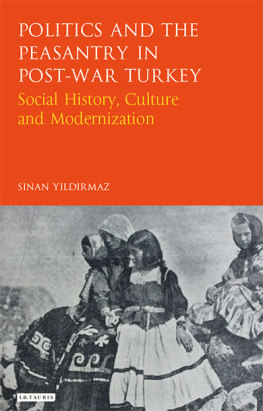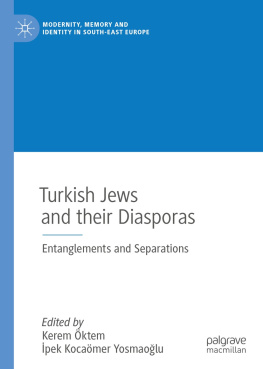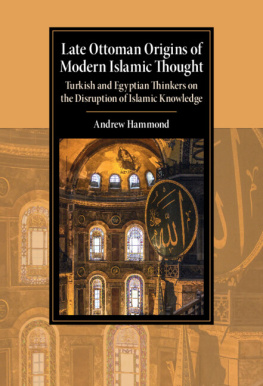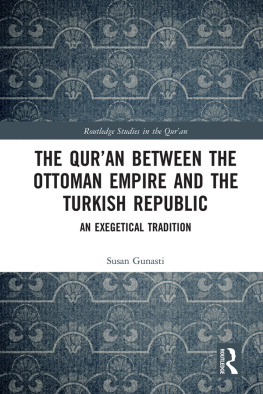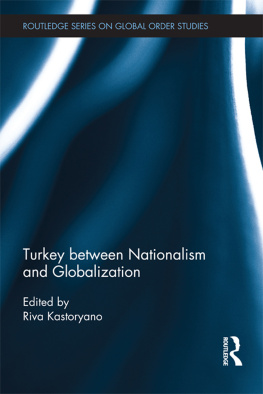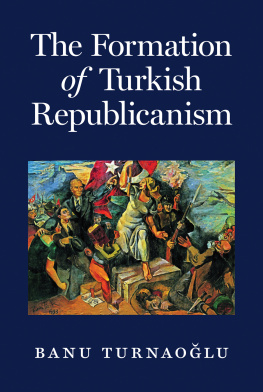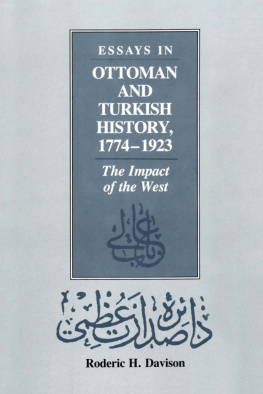
Ali Erken is Lecturer in Middle East Studies at the University of Marmara in Turkey. He completed his DPhil at Oxford University.
This book provides a detailed history of the American philanthropy in Republican Turkey from its emergence in 1923 to 1970. It is the first major study in any language on this hitherto neglected subject and will make a contribution to a number of fields including those concerned with USTurkish relations, Turkish intellectual history, and Turkish politics. It is a well-crafted, tightly argued, and rigorously executed study. Drawing upon original archival material collected from the archives of the Rockefeller and Ford Foundations, and those of Robert College kept at Columbia University, Erken maintains that there has been a persistent collaboration among Turkish politicians, intellectuals, artists and the Foundation officers in turning Turkey's vision towards the West. As he states, this analysis provides a key insight in understanding political relations between Turkey and the United States after 1923.
M. kr Haniolu,
Professor of Late Ottoman History,
Department of Near Eastern Studies,
Princeton University

Published in 2018 by
I.B.Tauris & Co. Ltd
London New York
www.ibtauris.com
Copyright 2018 Ali Erken
The right of Ali Erken to be identified as the author of this work has been asserted by the author in accordance with the Copyright, Designs and Patents Act 1988.
All rights reserved. Except for brief quotations in a review, this book, or any part thereof, may not be reproduced, stored in or introduced into a retrieval system, or transmitted, in any form or by any means, electronic, mechanical, photocopying, recording or otherwise, without the prior written permission of the publisher.
References to websites were correct at the time of writing.
Library of Modern Turkey 34
ISBN: 978 1 78831 170 0
eISBN: 978 1 78672 393 2
ePDF: 978 1 78673 393 1
A full CIP record for this book is available from the British Library
A full CIP record is available from the Library of Congress
Library of Congress Catalog Card Number: available
For my grandfathers and grandmothers
PREFACE
This book examines American philanthropy in Turkey from 1923 to 1970. Through a very detailed analysis of primary sources, the author investigates the activities of the Rockefeller and Ford foundations along with Robert College of Istanbul. He demonstrates common discursive practices between the educated elites in Turkey and American institutions in shaping Turkey's path to Westernisation. This process has involved the inculcation of Western rationality and cultural tastes through Foundation grants in medicine, scientific education, social sciences and humanities. It heavily relied on a close partnership between the creative minority of Turkey and key Foundation personalities. Drawing upon primary sources, the study reveals that there has been an ongoing collaboration between Turkish politicians, intellectuals, artists and Foundation officers in turning Turkey's vision towards the West. This analysis provides a complementary insight in understanding political relations between Turkey and the United States after 1923.
INTRODUCTION
The Republican leadership in Turkey and subsequent governments until the 1970s embraced Westernisation as the ultimate vision for the country's future. The scientific and modern spirit as articulated in the Republican discourse superseded ancient norms of religion and tradition associated with backwardness and bigotry. Through ideological and institutional tools, American institutions played a significant role in the making of a Western-oriented Turkey. This relationship intensified during the ideological polarisation of the Cold War, as the ruling elite in Turkey were eager to achieve democratic freedom and development. The research for this study is centred on the following questions: In what ways American philanthropy complemented the political vision of the Turkish ruling elite in the making of modern Turkey? What were the common discursive frameworks that were instrumental in establishing knowledge networks between the two countries? What were the key tools and strategies of this philanthropic contribution to the cultural and technological transformation of Turkey?
The American interest in the Middle East, known then as the Near East, was not derived only from its rich energy sources, but also from the fact that it was the centre of the world's second biggest religion in terms of population, namely Islam, and was the birth place of Christianity.
Nevertheless, the very Protestant nature of American involvement in the realm of education and social service faced a challenging test following the abolition of the Caliphate. This event and the Ottoman Empire's dissolution meant that it would no longer be possible to use a curriculum with a religious basis, either Islamic or Christian. American missionary schools found themselves in an ambivalent situation, doubtful of which direction the Republican reforms would steer the country. The Republic of Turkey was declared on 29 October 1923 under the leadership of Mustafa Kemal, and the new Turkish leadership would assert no political claims outside the boundaries of the new Turkey, which was appreciated by the Americans. It was important that, unlike the other great powers, the United States had not declared war against Turkey. The Turkish elites were willing to build a sustainable relationship with the United States as well, and considerable progress was achieved, partly thanks to the presence of the American High Commissioner in Turkey, Admiral Mark Bristol, who had a favourable view of the new Turkish state and its rulers. After the passing of new laws and regulations, only a handful of foreign colleges were allowed to remain open, including Robert College, thanks to its historical prestige and its success in revising its curriculum. Following these initial blows, both sides seemed to lean toward finding a middle ground. The Republican leadership quickly realised their Westernisation mission would not succeed without the urgent transfer of Western technical know-how and cultural norms, whilst the Americans had a clearer opinion about the ultimate vision of the Republican leadership. Struggling with this transition, Robert College staff understood that there were still plenty of opportunities for American institutions in this new context. Frank Caleb Gates, President of the College, wrote:
The impression in the United States is that the exigencies of the government make it impossible to carry on the work of our colleges in any satisfactory way. This is not at all the case, on the contrary we have an enlarged opportunity. There is in Turkey a freedom of thought and of inquiry such as has never been known before.
The kind of relations the Muslim world had experienced with the West during the eighteenth and nineteenth centuries could be described as full of conflict, tension and discontent, which was a challenge for the Americans to tackle on ideological and strategic terms. Despite these disadvantages, the activities of American missionaries in the fields of health and education helped build a more positive image. In such a reformist atmosphere, the Republican leadership often approached American experts and scholars in Turkey to consult them.


